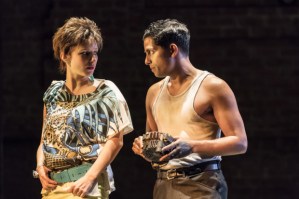Review: B (Royal Court)
Guillermo Calderón’s play is like an abstracted, philosophical cousin of Chris Morris’ ”Four Lions”
In the space of a decade, Chile incurred more than 200 terrorist attacks – roughly 30 a year on average. The bombs, mostly detonated late at night, were largely symbolic and broadly ineffective. Aside from a few minor injuries and one bomber’s death, they achieved very little, not least because no one openly claimed responsibility or offered a rationale.
Tackling the issue, Guillermo Calderón’s B is like an abstracted, philosophical cousin of Chris Morris’ satire Four Lions. Instead of imbecilic jihadis, he shows us two amateurish young female anarchists, waiting in a safe house to receive a bomb from their contact. Their plan is to detonate it outside a bank in the dead of night – a symbolic strike against capitalism – but to get their hands on the device, they must first go through a convoluted handover of codes and trust games that threatens to tip the whole thing into farce.
It doesn’t help that a nosy neighbour pokes her head round the door, leading to a bluffed cover story about a birthday party and a dead boyfriend, but when their contact turns up, bearing gift-wrapped explosives and wearing a T-shirt over his face, the three of them steadily tie themselves in knots with a tangle of secret knocks and codewords. Bombs are cheese or cows, in case anyone’s listening, and the plan itself keeps changing. What was meant to be a "noise cheese" is, in fact, a "nail cow", and its maker wants one of them to crap in it to make it more lethal. Not that it matters of course, if no-one’s nearby in the middle of the night…
Calderón taps into the inherent irrationality of terrorism – specifically in Chile, but B's resonance is wider than that. The moment attacks become a constant, or worse, an accepted aspect of life, they are instantly rendered entirely ineffective. Daniela Samal's cynical Alejandra aspires to join a long list of friends in prison, suggesting she’s long given up on changing anything, while, by fretting about being caught, Marcella (a droll Aimee-Ffion Edwards) seems more gripped by terror than the society around her.
There’s something vaguely Ortonesque about the way flawless logic turns into lunacy, but Calderón’s writing is too steadily static – at least in William Gregory’s straight-faced translation. Sam Pritchard follows suit with a deliberately dry and disjointed production that only sporadically gets the comedy to sing. It never quite builds or spirals out of control and, for all the theatrical absurdity of three masked terrorist clowns, B raises titters but not a lot more.
It’s a neat way to disarm the act of terrorism – not only by humanising the perpetrators, but by revealing the innate hope involved. As their contact, Paul Kaye is a middle-aged man acting on auto-pilot and, though he talks of weaponising the war, he’s lost all sight of his cause. The same, sadly, is true of the play and it dwells on one idea without fully developing its drama. This one just doesn’t quite go off.
B runs at the Royal Court until 21 October.















